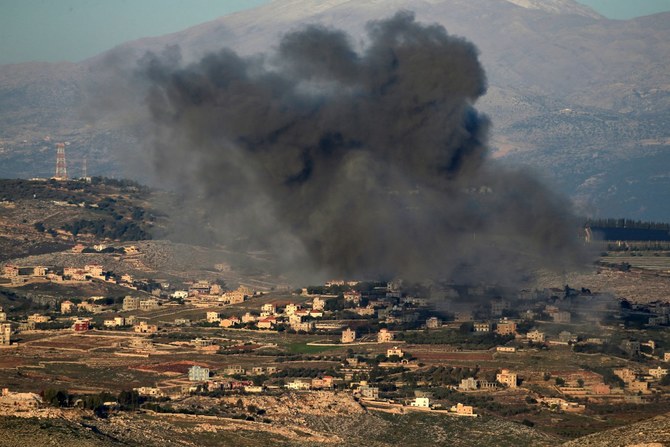
- ARAB NEWS
- 02 Jul 2025

BEIRUT: Hostilities between Hezbollah and the Israeli army on the southern Lebanese front were characterized on Wednesday by an abundance of rockets fired by both sides, causing deaths and injuries.
Israeli Army Radio announced that “an Iranian-made drone was intercepted over the Mediterranean off the coast of Beirut, launched from Iraq.”
Bassam Yassin, a retired Lebanese army brigadier general, ruled out the possibility of the drone being flown in Lebanese airspace.
Yassin told Arab News: “If the drone crosses Lebanese airspace, it will take a longer time. The shorter and logical route is through Syria, Jordan, and then Palestine.
A source who follows air traffic matters told Arab News: “The drone may have crossed Lebanese airspace, but no one can confirm (this) because following up on this matter is limited to the Lebanese army and no one has the right to deal with it.
“When drones cross European airspace, for example, they disrupt air traffic.
“Lebanon has been facing interference from Israel in terms of GPS maritime and air navigation since the conflict began with Hezbollah. However, Lebanon has alternative systems in place and there is no need to worry about aviation safety.”
Israeli strikes on Tuesday struck a residence located in the remote border town of Bint Jbeil. The house was completely demolished by the missiles, resulting in three fatalities. Among the victims were two brothers, Ali and Ibrahim Bazzi, along with Ibrahim’s wife, Shorouk Hammoud. Another member of the Bazzi family sustained injuries.
Ibrahim Bazzi had arrived in Lebanon recently after spending many years in Australia. His intention was to take his wife back to Australia with him so they could settle there. Ali Bazzi was a member of Hezbollah.
While their funerals took place on Wednesday, Hezbollah targeted Israeli military sites in the Shebaa Farms and Kfar Shuba Hills, using attack drones and more than 12 missiles, including Burkan missiles.
Israeli media reported that “missiles were launched from Lebanon towards an Israeli army position in Arab Al-Aramsha in Western Galilee.”
Hezbollah announced it had targeted “the Khirbet Maar site, its artillery positions, and the Israeli forces positioned around it with Burkan missiles, and they caused confirmed casualties.”
The Iran-backed group also announced that it had targeted “a tent of a special force of the Israeli enemy army south of the Al-Dhahira site with guided missiles, causing direct hits and leaving its members dead and wounded.”
Hezbollah also targeted a “new Israeli command position in the vicinity of the naval site with appropriate weapons.”
In addition, the group announced “a joint attack with assault drones on the enemy soldiers’ concentrations established behind its positions in the occupied Shebaa Farms, resulting in confirmed casualties.”
Israel’s Galilee Medical Center said that it had received “13 wounded people who were injured on the border with Lebanon, one of whom is in unstable condition as a result of the strikes by Hezbollah on various Israeli sites.”
Israeli army spokesman Avichay Adraee said in a post on X: “Hezbollah fired an anti-tank missile from Lebanon targeting a Greek Orthodox church in northern Israel, wounding two Israeli Christian citizens. When Israeli forces arrived to evacuate the wounded, Hezbollah fired another shell at the church, wounding nine of our soldiers.”
Meanwhile, Hezbollah has announced the death of two of its fighters: Hadi Hassan Awala, from the southern suburb of Beirut, and Ahmed Hassan Al-Dirani, from the town of Qsarnaba in the Bekaa.
An Israeli drone had targeted a car on the main road in Qlaileh on Tuesday night, killing those inside it.
Israeli attacks have targeted the outskirts of Shebaa, Rashaya, Aita al-Shaab, Kafr Kila, Jebbayn, Tayr Harfa, Yarin, and Wadi Hamul in Naqoura, while an Israeli drone hit the area between Al-Dahaira and Tayr Harfa.
Israeli warplanes have flown at medium altitude over Beirut, Mount Lebanon and other Lebanese regions, and have been noted at low altitude above Sidon and Zahrani.